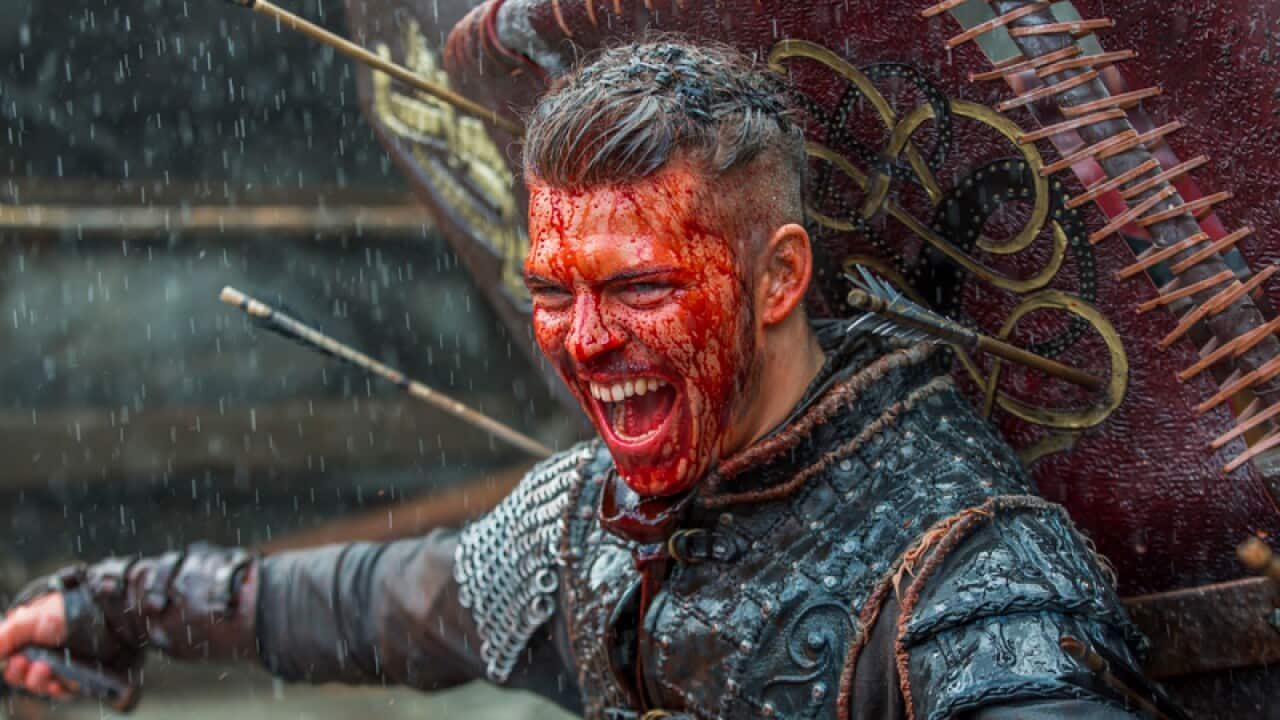All historical epics are a mix of faithful representation of true events and some creative licence to create an engaging, coherent narrative. SBS’s new big budget actioner, from the History Channel, follows suit, striving for authenticity weaved into an entertaining yarn.
"Much of our content is true to the historical record, and while we take some liberties for the purposes of drama and intrigue, history gives us at least the framework,” Knightfall showrunner Dominic Minghella to Bustle. “And – since the Templar story is so rich – often much more!"
So what’s fact and fiction in the show?
The Siege of Acre

Tom Landry leads the 'Knightfall' cast as Knight Templar Landry. Source: SBS
Knightfall begins with the bloody Siege of Acre in 1291, Israel. Acre had been the stronghold of the infamous order of warrior monks, the Knights Templar, who served as protectors of the Holy Land and Christianity. Spearheaded by Mamluk sultan Egypt Al-Ashraf Ṣalāḥ ad-Dīn Khalīl, the city was taken in 1291 by an army of 10,000 soldiers.
“There are scenes that are astonishingly faithful to the known events and historical sources,” historian and Knightfall consultant Dan Jones Black Girl Nerds. “The detail of the Siege of Acre 1291, which opens the first episode, for example, is drawn extensively from the so-called Templar of Tyre’s eyewitness account of that amazing urban battle.”
The Holy Grail

Source: SBS
You may be surprised by this verdict, but Jones believes the Grail and its storied mystery are a romantic fiction.
“All of this was high fantasy, which people in the Middle Ages would have recognised as such: the Holy Grail was no more real than SPECTRE in today’s James Bond films,” Jones in his book The Templars: The Rise and Spectacular Fall of God’s Holy Warriors. “Bogus pseudo-history became confused with the real history of Christianity, and of crusading. But the Holy Grail myth is a brilliant starting point for fiction.”
Whether you believe it to be a myth or elusive truth, if you’re making a series about the Knights Templar, the storied hunt for the Grail is inextricably linked to them. It’s a narrative drive any TV writing room would be mad to ignore.
Queen Joan of France and Navarre

Source: SBS
Queen Joan’s (Olivia Ross) power lay not only in her influence as queen consort of Philip IV (played in the series by Ed Stoppard). As the heir of Henry I, King of Navarre, the Queen also had serious sway by enhancing the monarchy with the rights to the Kingdom of Navarre, and the regions of Champagne and Brie.
But there was one hitch for the makers of Knightfall – the Queen died in 1305 and that didn’t fit with the show’s narrative timeline. So, to Jones, the writers incorporated the Queen into the story some years past her historical death. Also, her steamy affair with Templar Landry (Tom Cullen) in the story has been added as a piece of juicy creative licence.
Templar Landry

Source: SBS
It seems the protagonist of Knightfall,Templar Landry (Tom Cullen), is a fiction. But it’s a good bet he’s based on a blend of historical figures, such as Templar leaders like founder Hugues de Payens, Bernard de Tremelay, Gérard de Ridefort and Jacques de Molay, who was burned at the stake in 1314 when King Phillip IV orchestrated the order’s demise.
Pope Boniface VIII

Source: SBS
In , Pope Boniface VIII (played by Jim Carter in the series) was involved in a bitter clash with King Phillip IV of France, as the King undermined the French Papacy and demanded the clergy pay taxes. Pope Boniface excommunicated Phillip, and the King orchestrated a campaign to discredit him.
Knightfall Pope Boniface as “warm and avuncular - but also a seasoned politician” and “a stabilising, incorruptible force within a corrupt medieval world”.
Again, the writers faced a significant problem, with Pope Boniface dying in 1303, which didn’t fit with what they wanted to achieve in Knightfall’s narrative. So, again, they tinkered with time.
In the end, Jones, historical drama “works best when it draws inspiration from history, plays knowingly with its material, but never forgets that its currency is entertainment, not slavish fidelity to chronology. If you don’t believe me, go read all of Shakespeare’s history plays.”
premieres Thursday 1 February at 8.30pm on SBS and continues Thursdays at 9.30pm. SBS On Demand will have a available from 25 January. Then, all episodes will be available after broadcast anytime, anywhere, for free via .

